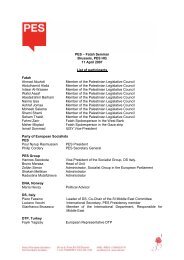Hedge funds and Private Equity - PES
Hedge funds and Private Equity - PES
Hedge funds and Private Equity - PES
Create successful ePaper yourself
Turn your PDF publications into a flip-book with our unique Google optimized e-Paper software.
Absolute returns<br />
The return that an asset achieves over a period of time. This measure simply looks at the appreciation<br />
or depreciation (expressed as a percentage) that an asset – usually a stock or a mutual<br />
fund – faces over a period of time. Absolute return differs from relative return because it is concerned<br />
with the return of the asset being looked at <strong>and</strong> does not compare it to any other measure.<br />
Absolute return <strong>funds</strong> look to make positive returns whether the overall market is up or down,<br />
while index tracking <strong>funds</strong> try to beat the index they are tracking.<br />
Alternative investments<br />
Usually refers to investments in hedge <strong>funds</strong>. Many hedge <strong>funds</strong> pursue strategies that are uncommon<br />
relative to mutual <strong>funds</strong>. Examples of alternative investment strategies are: long—short<br />
equity, event driven, statistical arbitrage, fixed income arbitrage, convertible arbitrage, short bias,<br />
global macro, <strong>and</strong> equity market neutral.<br />
AMF<br />
Autorité des marchés financiers, French Securities supervisor<br />
Asset stripping<br />
Asset stripping is the practice of buying a company in order to sell its assets individually at a<br />
profit.<br />
Attrition<br />
The reduction in staff <strong>and</strong> employees in a company through normal means, such as retirement<br />
<strong>and</strong> resignation. This is natural in any business <strong>and</strong> industry.<br />
Bafin<br />
German securities supervisor<br />
Basel Committee<br />
The Basel Committee on Banking Supervision is an institution created by the central bank Governors<br />
of the Group of Ten nations. It was created in 1974 <strong>and</strong> meets regularly four times a year.<br />
Its membership is now composed of senior representatives of bank supervisory authorities <strong>and</strong><br />
central banks from the G-10 countries (Belgium, Canada, France, Germany, Italy, Japan, the<br />
Netherl<strong>and</strong>s, Sweden, Switzerl<strong>and</strong>, the United Kingdom <strong>and</strong> the United States), <strong>and</strong> representatives<br />
from Luxembourg <strong>and</strong> Spain. It usually meets at the Bank for International Settlements in<br />
Basel, where its 12 member permanent Secretariat is located.<br />
The Basel Committee formulates broad supervisory st<strong>and</strong>ards <strong>and</strong> guidelines <strong>and</strong> recommends<br />
statements of best practice in banking supervision (see bank regulation or Basel II, for example)<br />
in the expectation that member authorities <strong>and</strong> other nation’s authorities will take steps to<br />
implement them through their own national systems, whether in statutory form or otherwise.<br />
Most of definitions are taken from: http://financial-dictionary.thefreedictionary.com<br />
Glossary<br />
243




